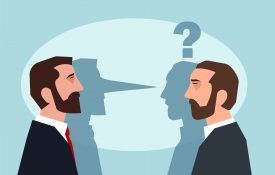-
Young Children Form First Impressions From Faces
Just like adults, children as young as 3 tend to judge an individual’s character traits, such as trustworthiness and competence, simply by looking at the person’s face. And they show remarkable consensus in the judgments
-
Your Unconscious Mind Is Better Than You Are at Detecting Lies
Pacific Standard: Can you tell if someone is lying to you? Newly published research suggests you actually have that ability—at least to an extent—but accessing it is a different story. In two experiments, researchers from
-

The Unconscious Mind Can Detect a Liar — Even When the Conscious Mind Fails
When it comes to detecting deceit, your automatic associations may be more accurate than conscious thought in pegging truth-tellers and liars, according to findings from a psychological study.
-
Young Children Form First Impressions From Faces
Just like adults, children as young as 3 tend to judge an individual’s character traits, such as trustworthiness and competence, simply by looking at the person’s face, new research shows. And they show remarkable consensus
-
Les personnes malades sont détectables à l’odeur (Sick people have a detectable odor)
Le Figaro: Bière rance, pain brûlé ou encore viande de boucherie: ces senteurs peu avenantes se dégagent de personnes atteintes respectivement de scrofule (une sorte d’affection tuberculeuse), de fièvre typhoïde et de fièvre jaune. Mais
-
You really do smell sick
The Boston Globe: Next time someone says that you stink, you might want to take it as friendly medical advice. In an experiment, healthy volunteers were injected with either saline placebo or lipopolysaccharide—a molecule found

